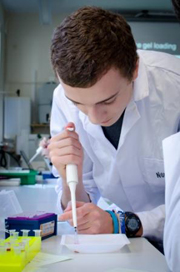Schools and teachers: Key Stage 5
The sessions offer students the opportunity to handle Museum specimens and take part in a range of object-based activities involving group-work and discussion.
In addition to the workshops listed below we are happy to tailor sessions for your students and curriculum needs. Please contact us on education@oum.ox.ac.uk
Sessions can be combined with a visit to the Botanic Garden or the Museum of the History of Science
Biodiversity and Evolution
Students handle and compare Museum specimens to explore the connection between taxonomy, classification and phylogeny. This is related to principles of natural selection, evolution and speciation across the natural world. ‘Biodiversity and Evolution’ teacher sheet

A question of taste: using PCR to investigate human evolution
In this workshop students learn something new about themselves. The workshop gives students the chance to analyse and compare their version of a bitter taste receptor gene (their genotype) to their ability to taste PTC (their phenotype). Students learn about molecular biology techniques by using research-quality equipment.
‘A Question of Taste’ teacher sheet
Museum study days
Settlers Day - Thursday 13th September 2018
This study day is based on the special Settlers exhibition and is aimed at both geography and biology students. Provisional programme
Geology Day - Monday 3rd December 2018
Cells Day - Tuesday 4th December 2018
The programme for each study day includes talks from research scientists and hands-on activities related to the theme; to see a sample programme from a study day, click here.Summer Research Placements
The Museum hosts research placements during the summer holiday for 16-19 year olds. Projects can cover a wide range of disciplines supported by specimens from the Earth and Life collections. Previous project titles include 'Can morphological traits predict behaviour or habitat?' and 'Investigating the Evolution of Flight'. Research projects can be submitted for a
Gold CREST award.
Online resources: learning more
- Browse learning more
Learning more provides a series of articles for older students on the history and science relating to the Museum and its collections of rocks, fossils and animals.
